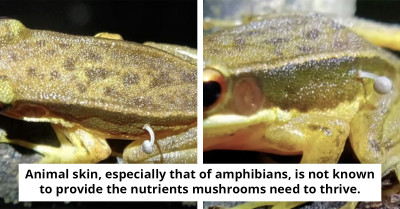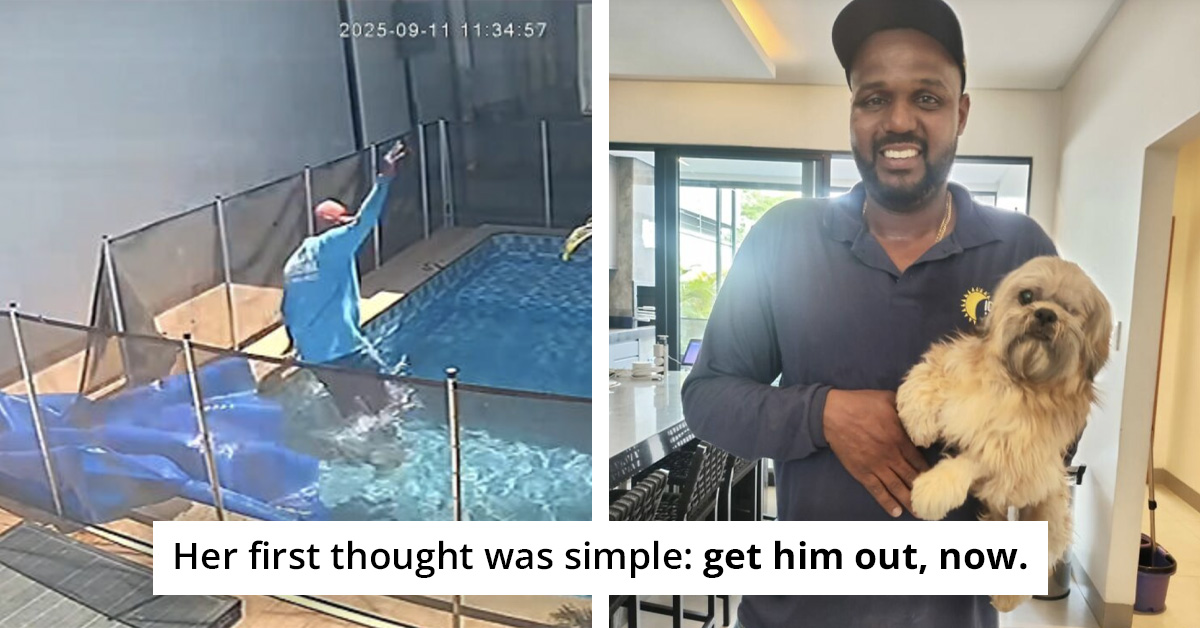Pawrent Blames Children For Cash Theft Only To Catch The Real Cat Criminal, Red-Pawed
Greetings, Cat Lovers! How is everyone feeling on this brand new day?
Are you all ready and pumped up to face what this new day brings? We know we are ready, and we hope you are too.
Today is going to be a fantastic day for us all. We will all be creative, productive, and sharp-minded.
We are all going to attract positive energy and abundance, and not just that, we are all eternally protected by the universe. Never forget that when you are feeling good, you have to do good and remain good because we are bringing something good your way.
Today we're bringing to your doorsteps a funny little Reddit thread, and we really hope that it will lift your spirits and make you smile. Okay, so how many of you know that cats love money?
Well, we are not exactly sure why they do it because it's not as if they know the value of money. However, if you gave them the option of choosing between a lavish $400 cat tree and a $5 bill, they would select the latter.
However, cats are also known to be crooks, which may be where their affection for money comes from. Yes, it makes the most sense now that we have given it some thought.
Well, it appears that another cat code has been deciphered. Enjoy this tale of another crook robbing his owner of money.
We have a cat burglar in the house...

Here is the cat criminal in my house
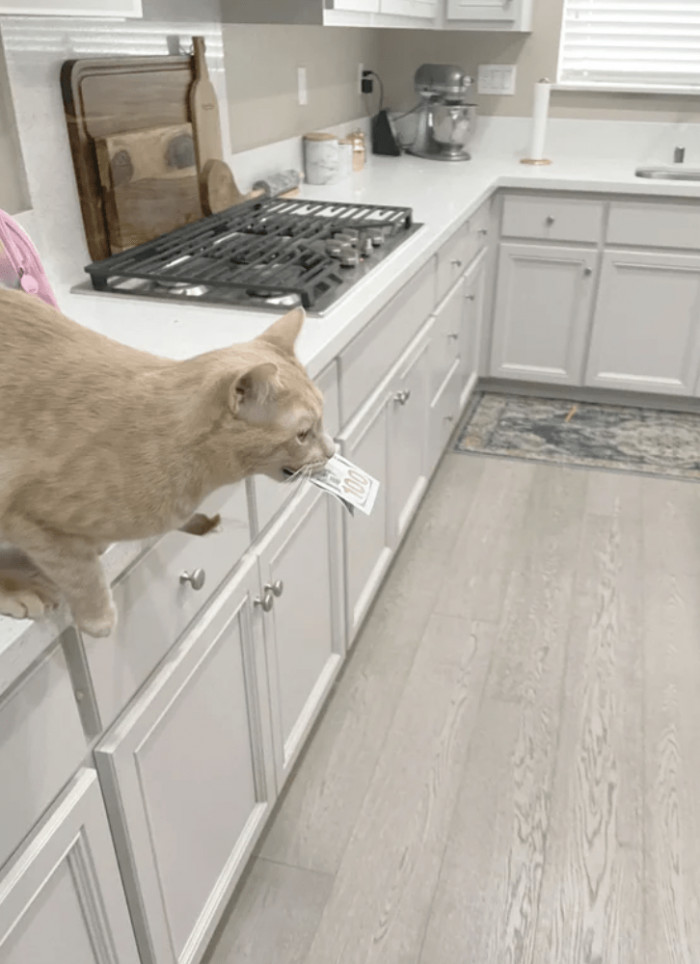
Listen, we are aware that this situation is undesirable and that the cat is almost certainly to blame for this theft. Yup, it is always presumed innocent until proven guilty.
There are only a few questions we need to ask in order to look into this issue further. At the time of the incident, where were the children?
Because they could have simply set up the cat if they had been nearby. Well, it's just an opinion...
The Importance of Perspective-Taking
The ability to take another's perspective is crucial in resolving conflicts and enhancing relationships. According to Dr. Susan David, an emotional agility expert, "Emotional agility is about being aware of your thoughts and feelings, and being able to respond to them in a way that is aligned with your values." In the context of the pawrent's situation, considering the children's feelings about being unfairly blamed might have led to a more constructive dialogue about trust and accountability.
To cultivate empathy within the family, parents can encourage perspective-taking exercises, such as role-reversal discussions or storytelling that emphasizes understanding others' viewpoints. This approach not only strengthens family relationships but also fosters a culture of empathy that can extend beyond the home into broader social interactions, as noted by Dr. Michael Thompson, a child psychologist who states, "Empathy is a vital skill that helps children navigate their social worlds and build meaningful relationships."
It's the big bills for me

In the realm of behavioral psychology, the concept of misattribution of blame can be particularly illuminating in interpreting the pawrent's initial reaction to the theft. According to research published in the Journal of Personality and Social Psychology, humans often misinterpret situations due to cognitive biases, such as the fundamental attribution error, where we tend to overemphasize personality traits over situational factors when attributing blame. In this case, the pawrent's immediate suspicion towards their children reflects a common tendency to assign blame based on available information, rather than considering alternative explanations, like a mischievous cat.
Understanding this bias can foster better communication in families and encourage more thoughtful consideration of the circumstances surrounding a behavior before jumping to conclusions.
The cat is not here to mess around

The cat does need some catnip, and it has to be bought

A huge amount of tuna

The Role of Humor in Stress Relief
Humor can play a significant role in coping with stressors, including the unexpected challenges of pet ownership. According to Dr. Dan Gilbert, a renowned happiness researcher, "Laughter is a powerful antidote to stress, helping to lower cortisol levels and enhance our overall well-being." When the pawrent discovered the true culprit of the cash theft, the humor of the situation likely served as a natural stress reliever, transforming a frustrating experience into a light-hearted story.
This highlights the importance of leveraging humor as a coping mechanism. Practical strategies could include sharing funny pet stories with friends or documenting quirky pet behaviors online, which not only fosters community but also encourages positive emotional experiences.
It's definitely fishing for the money and knows the big bills

But if we were to accept the story that this cat is actually guilty, we might argue that she has affluent taste. We figure she'll use it to buy a substantial amount of sushi, prawns, and tuna.
Please let us join this celebration as the people online are clearly doing so too. Here are more comments for you below...
The cat I brought home brings my mind flowers every spring
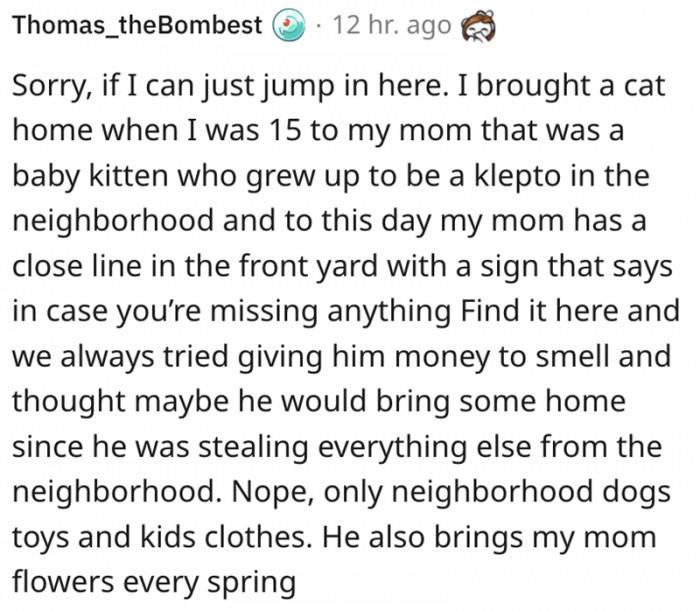
This commenter suggests getting him some play money

Developmental psychology offers insights into how children's understanding of responsibility and trust evolves. A study conducted at the University of Michigan found that children as young as six begin to develop a sense of fairness and accountability, influenced by their interactions within their family environment. In this context, the initial blame directed towards the children may have inadvertently shaped their perceptions of trust and familial dynamics.
To cultivate a healthy understanding of responsibility, parents can engage in open dialogues with their children about honesty and accountability. Such discussions can help children process their feelings and learn from mistakes, ultimately fostering stronger, trust-based relationships.
Do you think these cats can read numbers?
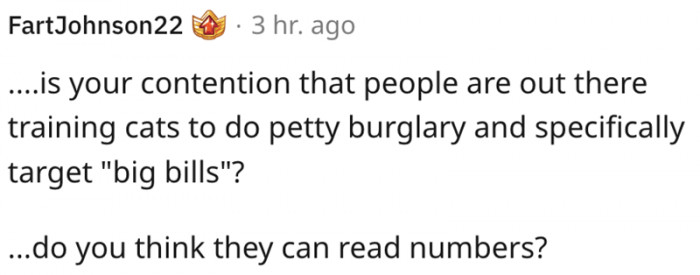
The cat was taken away from its job site

Most cats won't care, but maybe a few will

Emotional Regulation and Pet Ownership
Pet ownership has been linked to improved emotional regulation skills, which are vital in navigating daily stressors. Research published in the Journal of Veterinary Behavior indicates that interacting with pets can enhance emotional resilience, as pet owners often find comfort and companionship in their animals. In the case of the pawrent, discovering the cat's antics may have provided a moment of levity, allowing them to shift their emotional state from frustration to amusement.
To further enhance emotional regulation through pet ownership, owners can establish routines that include bonding activities with their pets, such as playtime or training sessions. Such practices not only strengthen the human-animal bond but also promote a sense of calm and stability in the owner's emotional landscape.
An unpaid kitten support

What the kids thought of him

This commenter is remembering a time...

Social learning theory posits that individuals learn behaviors through observation and imitation, particularly within the family unit. This theory can be applied to the scenario of the pawrent and the children, as they may unwittingly model behaviors based on how the pawrent reacts to the situation. According to Bandura's research on observational learning, children are likely to mimic the emotional responses and problem-solving strategies they witness in adults, which can either foster resilience or perpetuate negative coping mechanisms.
To encourage healthy emotional responses, it's beneficial for parents to model constructive problem-solving behaviors and emotional processing. Engaging in discussions about feelings and appropriate responses to challenges can help children develop their emotional intelligence and coping strategies.
The pawfect cover

Certainly, this post has gotten you super ready to face your day squarely. It certainly did that for these commenters, and they wasted no time in admitting it through their replies.
If this post did place a smile on your face, then spread the joy by sharing it with your family and friends. Don’t forget to leave your thoughts and opinions in the comments below.
Psychological Analysis
This article highlights how our initial reactions can often be clouded by cognitive biases, like the tendency to blame others based on immediate assumptions rather than considering all possibilities—like a mischievous cat! The humor that emerges from such situations not only lightens the mood but also serves as a valuable coping mechanism, reminding us that laughter can transform frustration into joy. Engaging in open communication about responsibility can foster trust within families and help children learn from these humorous mishaps.
Analysis generated by AI
Analysis & Recommendations
In examining the dynamics of blame and responsibility within the context of a pet-related incident, we see the interplay of cognitive biases, emotional regulation, and social learning theory at work. As noted by Dr. Daniel Kahneman, a Nobel laureate in economics, "Understanding how we think about blame can illuminate our decision-making processes." Research supports that grasping these psychological principles can lead to more effective communication and healthier family dynamics. Furthermore, Dr. Ramani Durvasula, a clinical psychologist, emphasizes that "fostering empathy and modeling constructive behaviors can significantly enhance relational trust."
Ultimately, recognizing the humor in unexpected situations, like a cat burglar in the house, can serve as a reminder of the joy pets bring into our lives while also providing valuable lessons in emotional resilience and perspective-taking.
